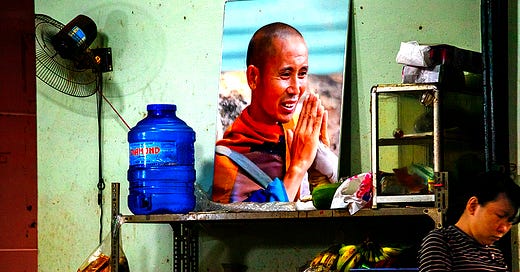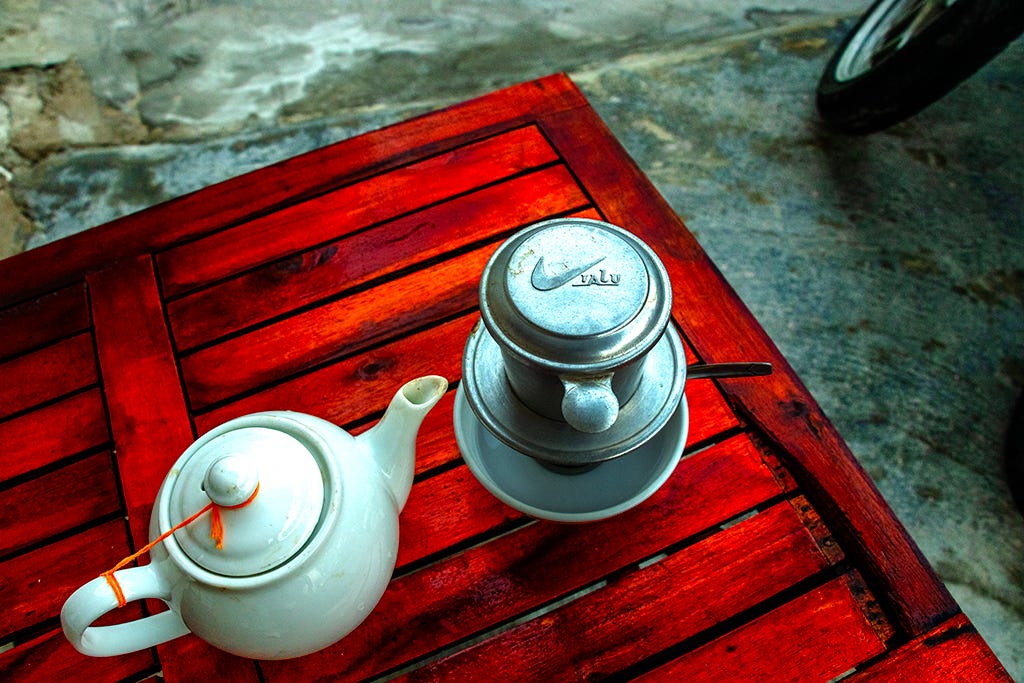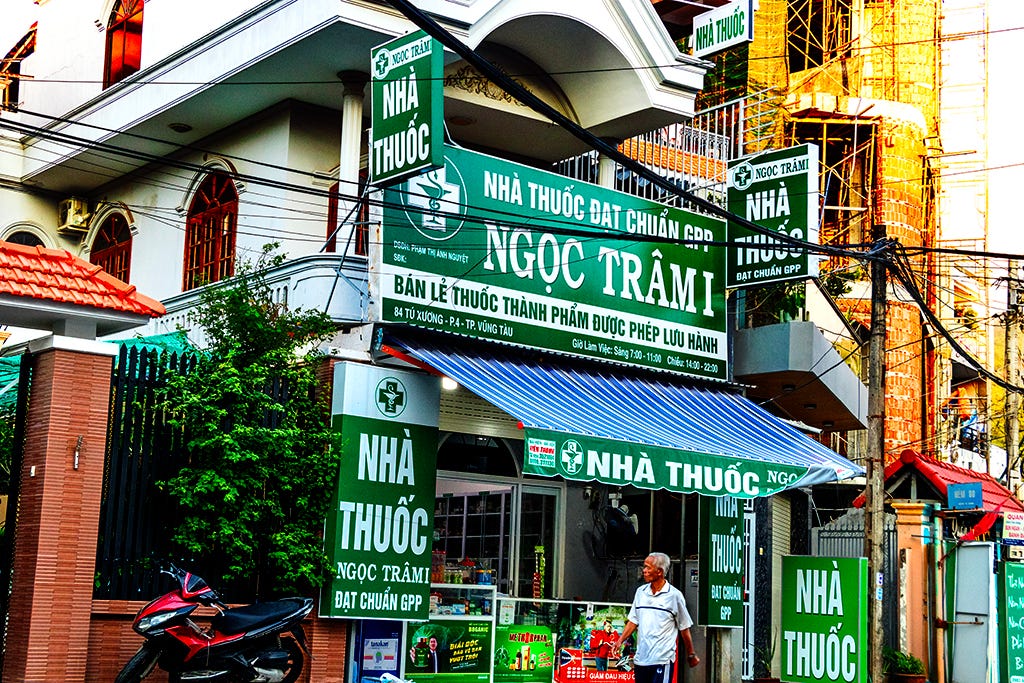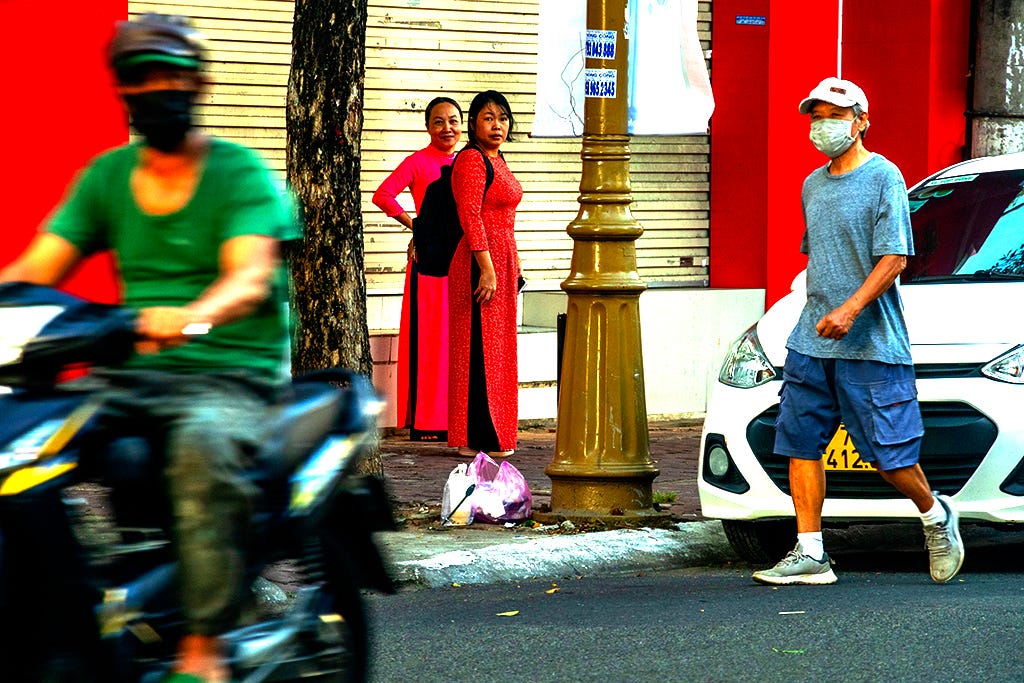[5:39AM in Vung Tau on 8/5/24]
In a highly derivative thus mercifully ignored piece-of-shit short story, “!”, there’s this nonsensical passage, “Everything seems chaotic at first, but nothing is chaotic. One can read anything: ants crawling on the ground; pimples on a face; trees in a forest. Fools will argue with you about this, but any surface can be deciphered. The entire world, as seen from an airplane, is just a warped surface.”
For once, I wasn’t kidding. Everything should be read most attentively. To illustrate, let’s read five banal scenes, as photographed within just an hour. Before the first, I had already passed Saigon Deli and Hà Nội Bánh Mì. Cheek to cheek on Nguyễn Văn Trỗi, they encapsulate not just the Vietnam War, but the north south division that exists in each country, England, France, Germany, Italy, China, Japan or Laos, etc. Even within a city, it’s there, so I was a South Philadelphian, period. Whenever I took a train to North or West Philly, I became so confused and terrified, I couldn’t explain how I ended up on the sidewalk the next day or week, next to some crack whore and bleeding gallons.
Turning right at Triệu Việt Vương, we’re at Cô Giang Market as merchants are setting up. It’s only 5:39AM, so still dark. On a shelf in a tiny store with smudgy walls, there’s a large color photo of Thích Minh Tuệ. For two months, this ascetic monk generated huge crowds wherever he walked. Though this thin, ugly man dressed in rags gave no sermons, everyone read not just nobility, but sacredness, into his serene self denial of just about everything. Everyone ignored his pleas to be left alone. When Thích Minh Tuệ finally disappeared, rumors spread he had been killed, perhaps by rich, fat monks with their expensive watches and lucrative YouTube channels.
Triệu Việt Vương was a king who died in 571AD at age 47. Cô Giang was killed by the French in 1930 at age 21.
Hearing “rags,” of course you’re reminded of Prato, that city mentioned by Dante just north of Florence. Prato native Curzio Malaparte, “Pratesi are boors, not because they work with rags, and live among rags, in that dry, impoverished smell of discarded tatters that’s the smell of Prato […]” They’re boors because they spoke their minds. They shouted in the piazza what others only dared to murmur between walls. We should all become Pratesi. Boor is from the Dutch boer, by the way, as in South African Boers.
One scene of a few seconds and I’m already exhausted! We must soldier on, however. If you’re a writer with “writer’s block,” most likely you ain’t no writer. There are millions of stories swarming just outside. At Cô Bắc and Tú Xương, Bitter Coffee has been demolished, so that’s a 800-page novel, but let’s skip that infinite reading.
Bet you didn’t know Vietnam as a coffee producer ranks behind only Brazil? Ạt 5:52AM, we must wait as each dolorous black drop drips into our bitterly black existence. The tin filter is uniquely South Vietnamese. Conquering NVA troops used to call it “pot sitting on a cup.” Cái nồi ngồi trên cái cốc. Today’s filter has a Nike swoosh, a mystery I haven’t solved. Next to our cup is a free pot of tea. This makes me think of an American sexpat who spent years here without knowing this common practice. The one time we had beer, he grabbed the teenaged waitress’ hand, a big no-no. His knowledge of Vietnam was mostly limited to whores in sexpat bars. Over 60, he sniffed his fingers with relish as he swooned over some cunt’s smell. As for politics, he advised me to stop talking about Jews.
The first Vietnamese coffee plantation only appeared in 1888. Now, cafes are more ubiquitous here than anywhere else. A bigger French revolution was in clothing. Even now, a tailor's sign routinely shows the Eiffel Tower. Legal codes are pháp luật, meaning French laws.
I’m hurt weasel coffee wasn’t invented in Vietnam, but Indonesia. It takes genius to brew any kind of shit and drink it. There’s an Ingo Schulze story where a young boy urges a man to devour caca. “It tastes fine,” the boy smiles. “From now on, we have nothing to be afraid of.” Combing through Schulze’s 33 Moments of Happiness and Simple Stories, I can’t find any shit, much less shit eating, but I’m certainly not capable of such brilliance.
Looking up at 6:03AM, we see a ghastly sight across the street. At Ngọc Trâm, “NHÀ THUỐC” [“PHARMACY”] is bombastically stated no less than eight times! You’d never see anything like that in Japan or even Thailand. Some might find such an offensive frontage charming. In that Vietnam War “masterpiece,” Apocalypse Now, the written word has disappeared, but what do you expect from mendacious Hollywood? Sam Cooke in 1959, “Don’t know much about history.” Whoopi Goldberg in 2024, “Stop! They’re not trying to do anything except talk about the history.” What a wonderful world! She shapes minds.
Caffeinated, we set out again, to find at 6:21AM a man in his 60’s carrying his baby granddaughter. It’s their morning walk. Though three generations in one house has disappeared in most countries, it’s still fairly common in Vietnam. His ADIDAS T-shirt marks him as a 21st century creature. If we get more casual, we’ll just go naked, a welcoming prospect to many, I’m sure. Our seething primitivism can also be slaked by war. Maybe that’s why there’s so much giddy anticipation.
For a preview, you can reread passages from Orwell’s Homage to Catalonia, “We were near the front line now, near enough to smell the characteristic smell of war—in my experience a smell of excrement and decaying food.”
And, “The position stank abominably, and outside the little enclosure of the barricade there was excrement everywhere. Some of the militiamen habitually defecated in the trench, a disgusting thing when one had to walk round it in the darkness. But the dirt never worried me. Dirt is a thing people make too much fuss about.”
More, “In La Granja every room that was not in use had been turned into a latrine—a frightful shambles of smashed furniture and excrement. The little church that adjoined it, its walls perforated by shell-holes, had its floor inches deep in dung.”
Soon, we won’t just figuratively shit in churches! Everything is going according to plan.
Emerging onto Ba Cu at 6:36AM, we catch two ladies in vermilion and deep red ao dais. Nguyễn Phúc Khoát (1714-1781) is generally credited with inventing a proto ao dai, áo ngũ thân, and Nguyễn Cát Tường (1912-1946) is most responsible for its modern form.
Framing these lovelies are two masked doofuses, so it’s not a throwback to my childhood or even 2019. Everything has been changed.
[5:52AM in Vung Tau on 8/5/24]
[6:03AM in Vung Tau on 8/5/24]
[6:21AM in Vung Tau on 8/5/24]
[6:36AM in Vung Tau on 8/5/24]








Hi everyone,
I just inserted another paragraph into the coffee section:
The first Vietnamese coffee plantation only appeared in 1888. Now, cafes are more ubiquitous here than anywhere else. A bigger French revolution was in clothing. Even now, a tailor's sign routinely shows the Eiffel Tower. Legal codes are pháp luật, meaning French laws.
Linh
At least it's not flashing LED signs...